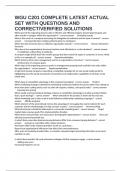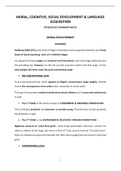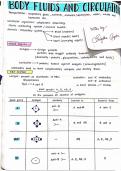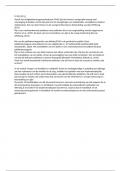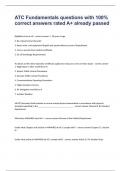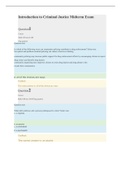Research Methods in Psychology (Athabasca University)
, lOMoAR cPSD| 6353920
The final Psych 304 exam will be taken online: a three-hour, invigilated, closed-book
exam comprising multiple-choice questions, short-answer questions, essay questions, and
problems to solve. A minimum grade of 50% is required to pass the exam. To receive
credit for the course, you mustpass the final exam and achieve an overall course grade of
at least 50%.
Unit 1
1. What is the difference between empirical and non-empirical methods of
knowing about behaviour?
a. Empirical methods are based off of experiences
i. Intuition-judgement not based on reasoned steps
ii. Common sense- intelligence shared by a large group of people
b. Non empirical methods are based off of logic
i. Authority- based on someone else's knowledge
ii. Logic - based on deductive and non deductive reasoning
2. When is logic not a good way of knowing the truth?
a. Logic can only tell you one part of a solution you need to combine it with
observation, sometimes what is logical is not the right answer
3. Describe two basic limitations of common sense as a way of knowing.
a. It changes over time
b. It is not theoretical it deals with things sensibly
4. How do common sense and science differ?
a. Common sense is a shared practical intelligence and science is objective, people
put their own opinions in common sense
5. What does “science is objective” mean?
a. That despite your own prejudice you look at it with no outside thoughts.
b. Any person with normal perception looking at it would see it the same way
c. Ex. there are five apples on the table
6. What are the characteristics of science? Explain.
, lOMoAR cPSD| 6353920
a. Science is empirical - you should rely on experiences, more than you should rely
on authority, common sense, and logic.
b. Science is objective - Any person with normal perception looking at it would see
it the same way
c. Science is self correcting- new things are always being discovered, the new
corrects the previous fault
d. Science is progressive- it always moves forward adding more information
e. Science is tentative- it never claims to have the whole truth and is always willing
to accept new truth
f. Science is parsimonious- uses the simplest explanation
g. Science is concerned with theory- concerned with why things happen
7. What is the principle of parsimony in science?
a. To use the simplest possible explanation
8. Briefly describe the working assumptions of science.
a. Realism - the idea that the objects in the world exist outside of just our
perception. EX that when we leave a room everything doesn't stand still till we
come back
b. Rationality - idea that reasoning is the basis for solving problems
c. Regularity - idea that there are recurring patterns that conform with a natural law.
Ex. When you open the door in the morning you will still be on earth, not in
space.
d. Discoverability- idea that it is possible to learn solutions to questions posed
e. Determinism - all events happen because of the one before it
9. Describe the criteria for establishing a cause-and-effect relationship.
a. The cause must occur before the effect.
b. Whenever the cause occurs, the effect must also occur.
c. There must not be another factor that can explain the relationship between the
cause and effect.
Key terms
● empirical methods


